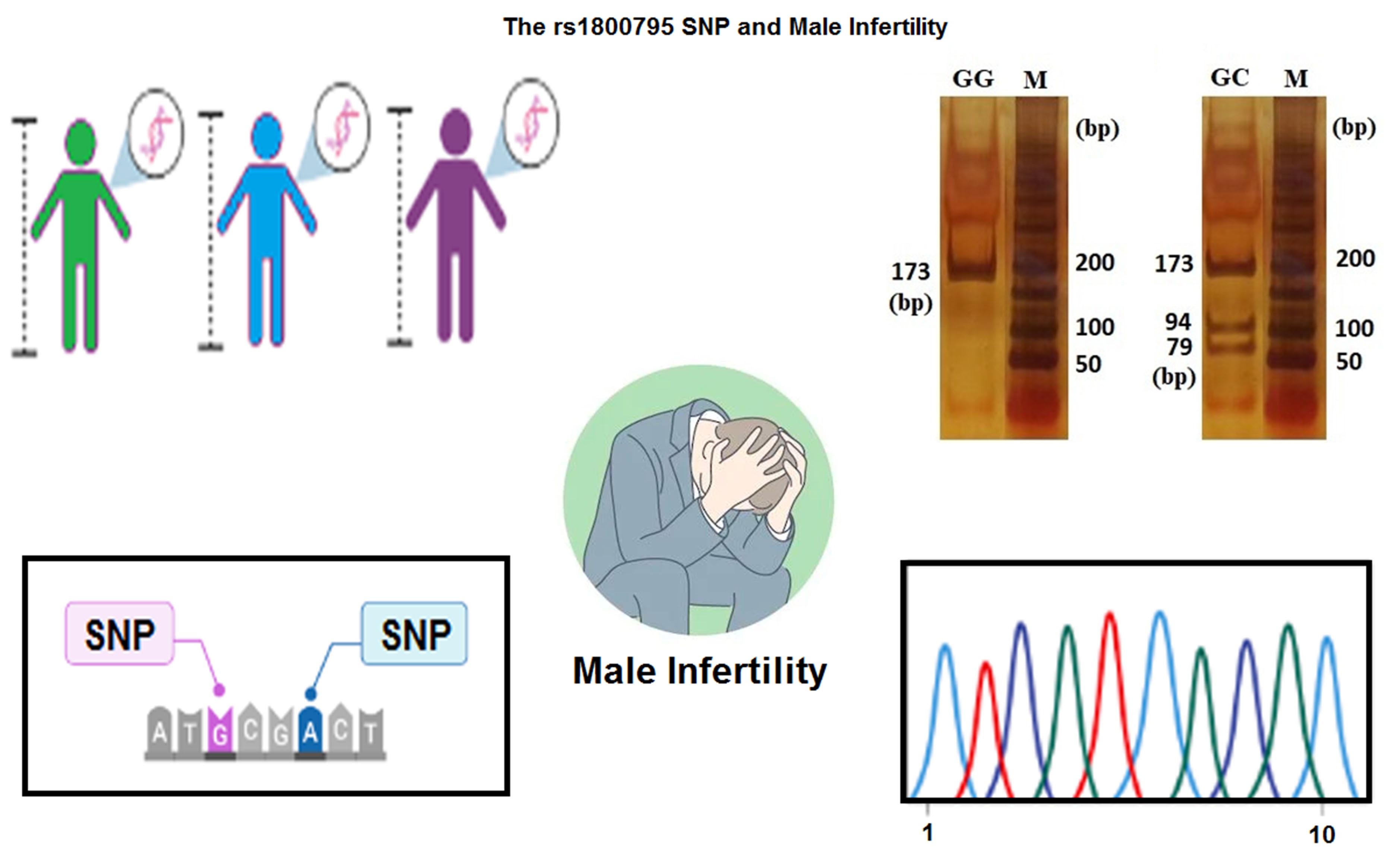Sun, Dec 14, 2025
[Archive]
Volume 22, Issue 12 (December 2024)
IJRM 2024, 22(12): 1015-1024 |
Back to browse issues page
Ethics code: IR.KAUMS.REC.1394.58
Download citation:
BibTeX | RIS | EndNote | Medlars | ProCite | Reference Manager | RefWorks
Send citation to:



BibTeX | RIS | EndNote | Medlars | ProCite | Reference Manager | RefWorks
Send citation to:
Zamani-Badi T, Karimian M, Amini Mahabadi J, Rafatmanesh A, Nikzad H. IL-6-174 G/C transversion might decrease male infertility risk: A case-control study. IJRM 2024; 22 (12) :1015-1024
URL: http://ijrm.ir/article-1-3217-en.html
URL: http://ijrm.ir/article-1-3217-en.html
Tayyebeh Zamani-Badi1 

 , Mohammad Karimian2
, Mohammad Karimian2 

 , Javad Amini Mahabadi3
, Javad Amini Mahabadi3 

 , Atieh Rafatmanesh4
, Atieh Rafatmanesh4 

 , Hossein Nikzad *5
, Hossein Nikzad *5 




 , Mohammad Karimian2
, Mohammad Karimian2 

 , Javad Amini Mahabadi3
, Javad Amini Mahabadi3 

 , Atieh Rafatmanesh4
, Atieh Rafatmanesh4 

 , Hossein Nikzad *5
, Hossein Nikzad *5 


1- Anatomical Sciences Research Center, Institute for Basic Sciences, Kashan University of Medical Sciences, Kashan, Iran.
2- Department of Molecular and Cell Biology, Faculty of Basic Sciences, University of Mazandaran, Babolsar, Iran.
3- Anatomical Sciences Research Center, Institute for Basic Sciences, Kashan University of Medical Sciences, Kashan, Iran. & Gametogenesis Research Center, Kashan University of Medical Sciences, Kashan, Iran.
4- Gametogenesis Research Center, Kashan University of Medical Sciences, Kashan, Iran.
5- Gametogenesis Research Center, Kashan University of Medical Sciences, Kashan, Iran. ,hnikzad1343@gmail.com
2- Department of Molecular and Cell Biology, Faculty of Basic Sciences, University of Mazandaran, Babolsar, Iran.
3- Anatomical Sciences Research Center, Institute for Basic Sciences, Kashan University of Medical Sciences, Kashan, Iran. & Gametogenesis Research Center, Kashan University of Medical Sciences, Kashan, Iran.
4- Gametogenesis Research Center, Kashan University of Medical Sciences, Kashan, Iran.
5- Gametogenesis Research Center, Kashan University of Medical Sciences, Kashan, Iran. ,
Abstract: (721 Views)
Background: Genetic predispositions have been identified as important factors in male infertility. Among the many genes related to male reproductive function, interleukin 6 (IL-6) has emerged as a key player. Despite the growing recognition of genetic factors in male infertility, the specific association between the IL-6-174 G/C genetic polymorphism and male infertility remains an area that needs further investigation.
Objective: This investigation explores the correlation between the IL-6-174 G/C transversion and male infertility.
Materials and Methods: In a case-control study, a total of 314 men who referred to the Kashan Infertility Centre, Shahid Beheshti hospital, Kashan, Iran, were enrolled for IL-6-174 G/C polymorphism analysis. The study comprised 163 infertile participants as the case group and 151 fertile men as the control group. Following the screening, 2 ml of whole blood was collected from each participant. Cases were categorized into 3 subgroups based on World Health Organization criteria: (i) nonobstructive azoospermia (n = 42), (ii) oligozoospermia (n = 61), and (iii) asthenozoospermia (n = 60). After DNA extraction, genotypes of the samples at the -174 G/C (rs1800795) locus were determined using the polymerase chain reaction-restriction fragment length polymorphism method.
Results: Our genetic investigation demonstrated a significant association between the GC genotype and male infertility. Furthermore, a correlation was observed between the heterozygous GC genotype and reduced risk of oligozoospermia and asthenospermia. Additionally, the C allele was correlated with a decreased risk of infertility and specific subgroups such as oligozoospermia and asthenospermia.
Conclusion: Our findings suggest that the IL-6-174 G/C transversion could potentially serve as a protective genetic factor against male infertility.
Objective: This investigation explores the correlation between the IL-6-174 G/C transversion and male infertility.
Materials and Methods: In a case-control study, a total of 314 men who referred to the Kashan Infertility Centre, Shahid Beheshti hospital, Kashan, Iran, were enrolled for IL-6-174 G/C polymorphism analysis. The study comprised 163 infertile participants as the case group and 151 fertile men as the control group. Following the screening, 2 ml of whole blood was collected from each participant. Cases were categorized into 3 subgroups based on World Health Organization criteria: (i) nonobstructive azoospermia (n = 42), (ii) oligozoospermia (n = 61), and (iii) asthenozoospermia (n = 60). After DNA extraction, genotypes of the samples at the -174 G/C (rs1800795) locus were determined using the polymerase chain reaction-restriction fragment length polymorphism method.
Results: Our genetic investigation demonstrated a significant association between the GC genotype and male infertility. Furthermore, a correlation was observed between the heterozygous GC genotype and reduced risk of oligozoospermia and asthenospermia. Additionally, the C allele was correlated with a decreased risk of infertility and specific subgroups such as oligozoospermia and asthenospermia.
Conclusion: Our findings suggest that the IL-6-174 G/C transversion could potentially serve as a protective genetic factor against male infertility.
Type of Study: Original Article |
Subject:
Reproductive Genetics
References
1. Bhattacharya I, Sharma SS, Majumdar SS. Etiology of male infertility: An update. Reprod Sci 2024; 31: 942-965. [DOI:10.1007/s43032-023-01401-x] [PMID]
2. Karimian M, Parvaresh L, Behjati M. Genetic variations as molecular diagnostic factors for idiopathic male infertility: Current knowledge and future perspectives. Expert Rev Mol Diagn 2021; 21: 1191-1210. [DOI:10.1080/14737159.2021.1985469] [PMID]
3. Karimian M, Babaei F. Large-scale mtDNA deletions as genetic biomarkers for susceptibility to male infertility: A systematic review and meta-analysis. Int J Biol Macromol 2020; 158: 85-93. [DOI:10.1016/j.ijbiomac.2020.04.216] [PMID]
4. Zamani‐Badi T, Nikzad H, Karimian M. IL‐1RA VNTR and IL‐1α 4845G> T polymorphisms and risk of idiopathic male infertility in Iranian men: A case-control study and an in silico analysis. Andrologia 2018; 50: e13081. [DOI:10.1111/and.13081] [PMID]
5. Zamani-Badi T, Karimian M, Azami-Tameh A, Nikzad H. Association of C3953T transition in interleukin 1β gene with idiopathic male infertility in an Iranian population. Hum Fertil 2017; 22: 111-117. [DOI:10.1080/14647273.2017.1384857] [PMID]
6. Alves-Silva T, Freitas GA, Húngaro TGR, Arruda AC, Oyama LM, Avellar MCW, et al. Interleukin-6 deficiency modulates testicular function by increasing the expression of suppressor of cytokine signaling 3 (SOCS3) in mice. Sci Rep 2021; 11: 11456. [DOI:10.1038/s41598-021-90872-6] [PMID] [PMCID]
7. Fraczek M, Kurpisz M. Cytokines in the male reproductive tract and their role in infertility disorders. J Reprod Immunol 2015; 108: 98-104. [DOI:10.1016/j.jri.2015.02.001] [PMID]
8. Li X, Ni M, Xing S, Yu Y, Zhou Y, Yang S, et al. Reactive oxygen species secreted by leukocytes in semen induce self-expression of interleukin-6 and affect sperm quality. Am J Mens Health 2020; 14: 1557988320970053. [DOI:10.1177/1557988320970053] [PMID] [PMCID]
9. Sharma A, Singh K, Biswas A, Ranjan R, Kishor K, Pandey H, et al. Impact of interleukin 6 promoter polymorphisms (-174 G> C,-572 G> C and -597 G> A) on plasma IL-6 levels and their influence on the development of DVT: A study from India. Hematology 2018; 23: 833-838. [DOI:10.1080/10245332.2018.1483546] [PMID]
10. Zhang M, Xu J, Bao X, Niu W, Wang L, Du L, et al. Association between genetic polymorphisms in interleukin genes and recurrent pregnancy loss: A systematic review and meta-analysis. PloS One 2017; 12: e0169891. [DOI:10.1371/journal.pone.0169891] [PMID] [PMCID]
11. Ayelign B, Negash M, Andualem H, Wondemagegn T, Kassa E, Shibabaw T, et al. Association of IL-10 (-1082 A/G) and IL-6 (-174 G/C) gene polymorphism with type 2 diabetes mellitus in Ethiopia population. BMC Endocr Disord 2021; 21: 70. [DOI:10.1186/s12902-021-00738-1] [PMID] [PMCID]
12. González-Castro TB, Hernández-Díaz Y, Pérez-Hernández N, Tovilla-Zárate CA, Juárez-Rojop IE, López-Narvaez ML, et al. Interleukin 6 (rs1800795) gene polymorphism is associated with cardiovascular diseases: A meta-analysis of 74 studies with 86,229 subjects. EXCLI J 2019; 18: 331-355.
13. Shukla KK, Agnihotri S, Gupta A, Mahdi AA, Mohamed EA, Sankhwar SN, et al. Significant association of TNFα and IL-6 gene with male infertility--an explorative study in Indian populations of Uttar Pradesh. Immunol Lett 2013; 156: 30-37. [DOI:10.1016/j.imlet.2013.08.011] [PMID]
14. Sobhan MR, Mahdinezhad-Yazdi M, Dastgheib SA, Ahrar H, Aghili K, Neamatzadeh H. Association of the IL-6 -174G > C (rs1800795) polymorphism with adolescent idiopathic scoliosis: Evidence from a case-control study and meta-analysis. Rev Bras Ortop 2020; 55: 17-26. [DOI:10.1055/s-0039-1700813] [PMID] [PMCID]
15. Jamali S, Karimian M, Nikzad H, Aftabi Y. The c.-190 C>A transversion in promoter region of protamine1 gene as a genetic risk factor for idiopathic oligozoospermia. Mol Biol Rep 2016; 43: 795-802. [DOI:10.1007/s11033-016-4017-8] [PMID]
16. Kumar A, Kapoor R, Mishra S, Joshi A, Tiwari N, Ramamurthy HR. Non-analgesic benefits of combined thoracic epidural analgesia with general anesthesia in on-pump pediatric cardiac surgery: A prospective observational study. Med J Armed Forces India 2024; 80: 80-90. [DOI:10.1016/j.mjafi.2023.01.006] [PMID] [PMCID]
17. Jin Y, Wang J, Bachtiar M, Chong SS, Lee CG. Architecture of polymorphisms in the human genome reveals functionally important and positively selected variants in immune response and drug transporter genes. Hum Genomics 2018; 12: 43. [DOI:10.1186/s40246-018-0175-1] [PMID] [PMCID]
18. Bryk J, Hardouin E, Pugach I, Hughes D, Strotmann R, Stoneking M, et al. Positive selection in East Asians for an EDAR allele that enhances NF-κB activation. PloS One 2008; 3: e2209. [DOI:10.1371/journal.pone.0002209] [PMID] [PMCID]
19. Karimian M, Hosseinzadeh Colagar A. Human MTHFR-G1793A transition may be a protective mutation against male infertility: A genetic association study and in silico analysis. Hum Fertil 2018; 21: 128-136. [DOI:10.1080/14647273.2017.1298161] [PMID]
20. Moradkhani A, Azami M, Assadi S, Ghaderi M, Azarnezhad A, Moradi Y. Association of vitamin D receptor genetic polymorphisms with the risk of infertility: A systematic review and meta-analysis. BMC Pregnancy Childbirth 2024; 24: 398. [DOI:10.1186/s12884-024-06590-0] [PMID] [PMCID]
21. Mobasseri N, Nikzad H, Karimian M. Protective effect of oestrogen receptor α-PvuII transition against idiopathic male infertility: A case-control study and meta-analysis. Reprod Biomed Online 2019; 38: 588-598. [DOI:10.1016/j.rbmo.2019.01.008] [PMID]
22. Mojarrad M, Saburi E, Golshan A, Moghbeli M. Genetics and molecular biology of male infertility among Iranian population: An update. Am J Transl Res 2021; 13: 5767-5785.
23. Dutta S, Sengupta P, Slama P, Roychoudhury S. Oxidative stress, testicular inflammatory pathways, and male reproduction. Int J Mol Sci 2021; 22: 10043. [DOI:10.3390/ijms221810043] [PMID] [PMCID]
24. Lubrano V, Gabriele M, Puntoni MR, Longo V, Pucci L. Relationship among IL-6, LDL cholesterol and lipid peroxidation. Cell Mol Biol Lett 2015; 20: 310-322. [DOI:10.1515/cmble-2015-0020] [PMID]
25. Hussain T, Kandeel M, Metwally E, Murtaza G, Kalhoro DH, Yin Y, et al. Unraveling the harmful effect of oxidative stress on male fertility: A mechanistic insight. Front Endocrinol 2023; 14: 1070692. [DOI:10.3389/fendo.2023.1070692] [PMID] [PMCID]
26. Park Y-J, Pang M-G. Mitochondrial functionality in male fertility: From spermatogenesis to fertilization. Antioxidants 2021; 10: 98. [DOI:10.3390/antiox10010098] [PMID] [PMCID]
27. Amorini AM, Listorti I, Bilotta G, Pallisco R, Saab MW, Mangione R, et al. Antioxidant-based therapies in male infertility: Do we have sufficient evidence supporting their effectiveness? Antioxidants 2021; 10: 220. [DOI:10.3390/antiox10020220] [PMID] [PMCID]
28. Rosenberg LE, Rosenberg DD. Human genes and genomes: Science, health, society. 1st Ed. US: Academic Press; 2013.
29. Manolio TA, Collins FS, Cox NJ, Goldstein DB, Hindorff LA, Hunter DJ, et al. Finding the missing heritability of complex diseases. Nature 2009; 461: 747-753. [DOI:10.1038/nature08494] [PMID] [PMCID]
30. Amiteye S. Basic concepts and methodologies of DNA marker systems in plant molecular breeding. Heliyon 2021; 7: e08093. [DOI:10.1016/j.heliyon.2021.e08093] [PMID] [PMCID]
Send email to the article author
| Rights and permissions | |
 |
This work is licensed under a Creative Commons Attribution-NonCommercial 4.0 International License. |





